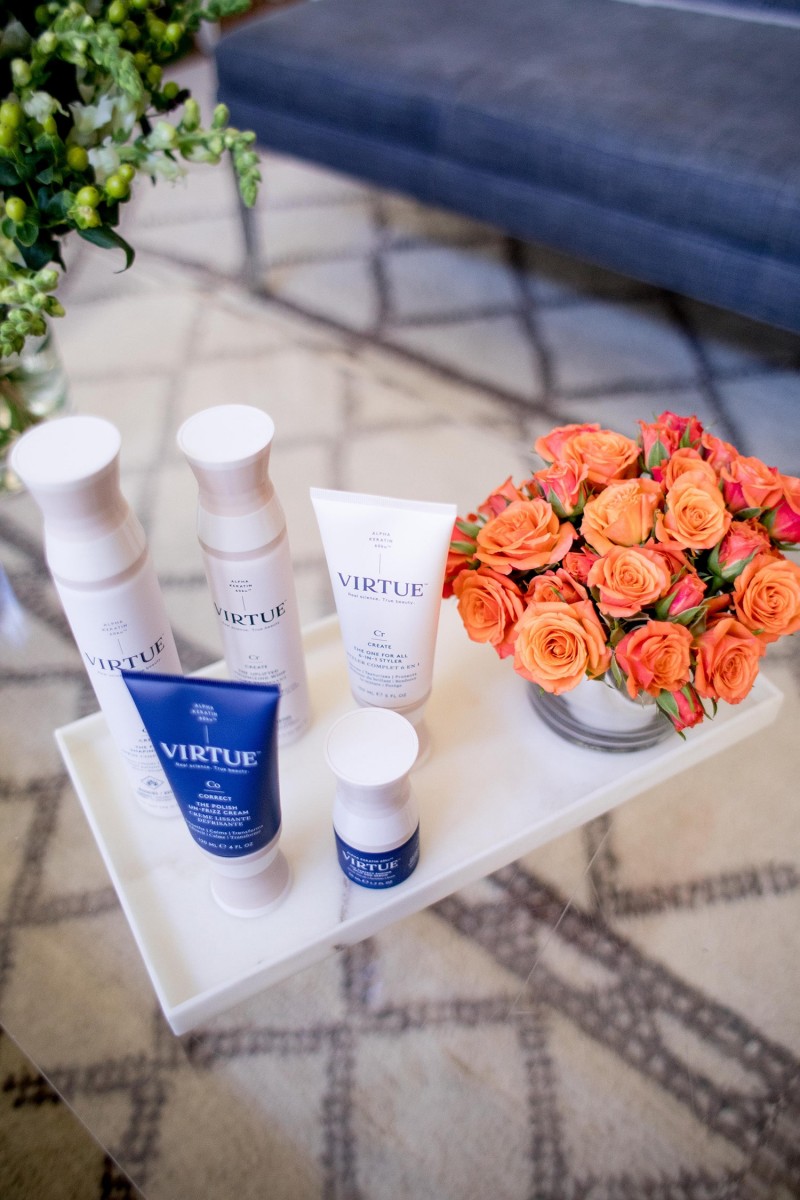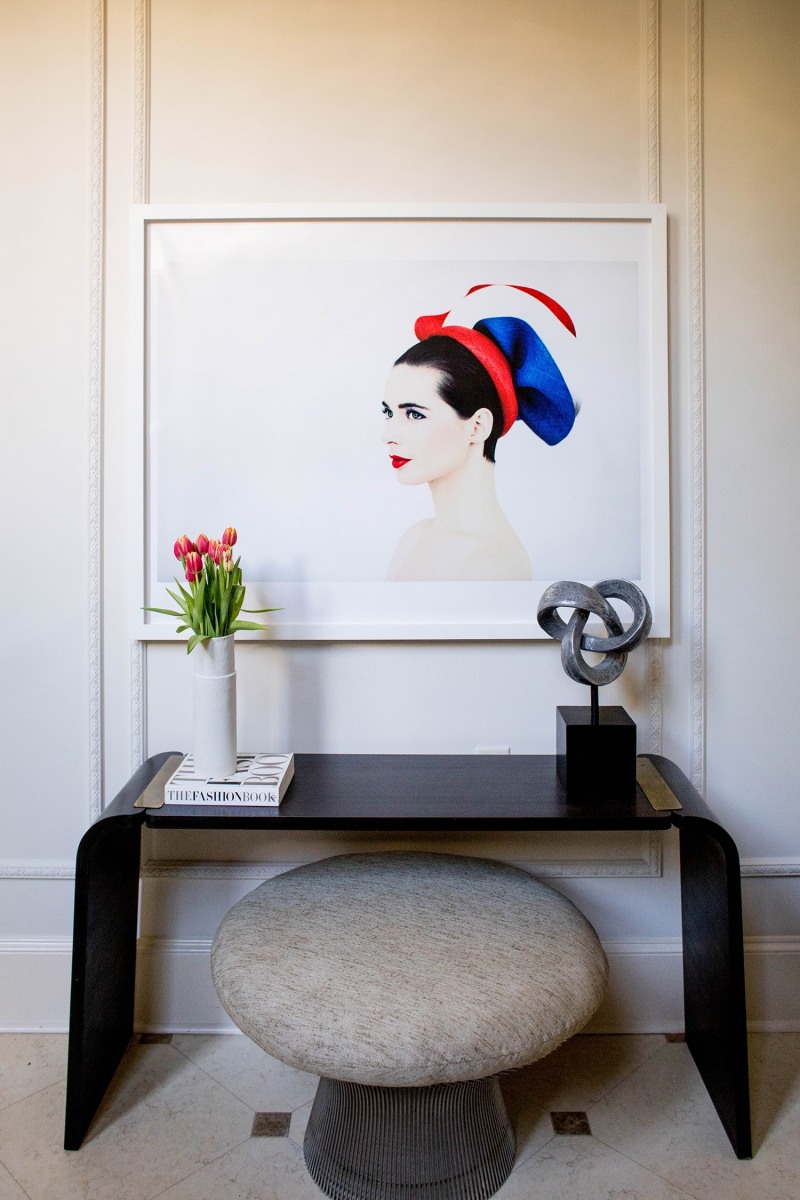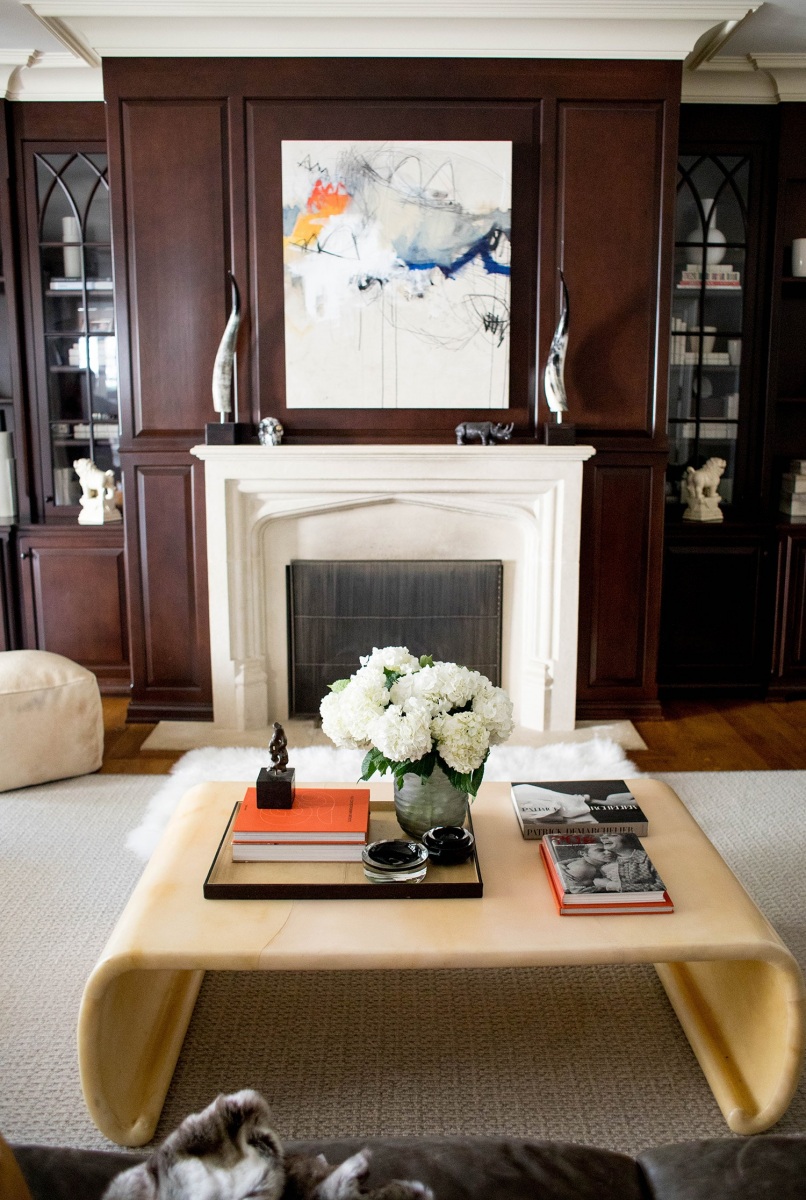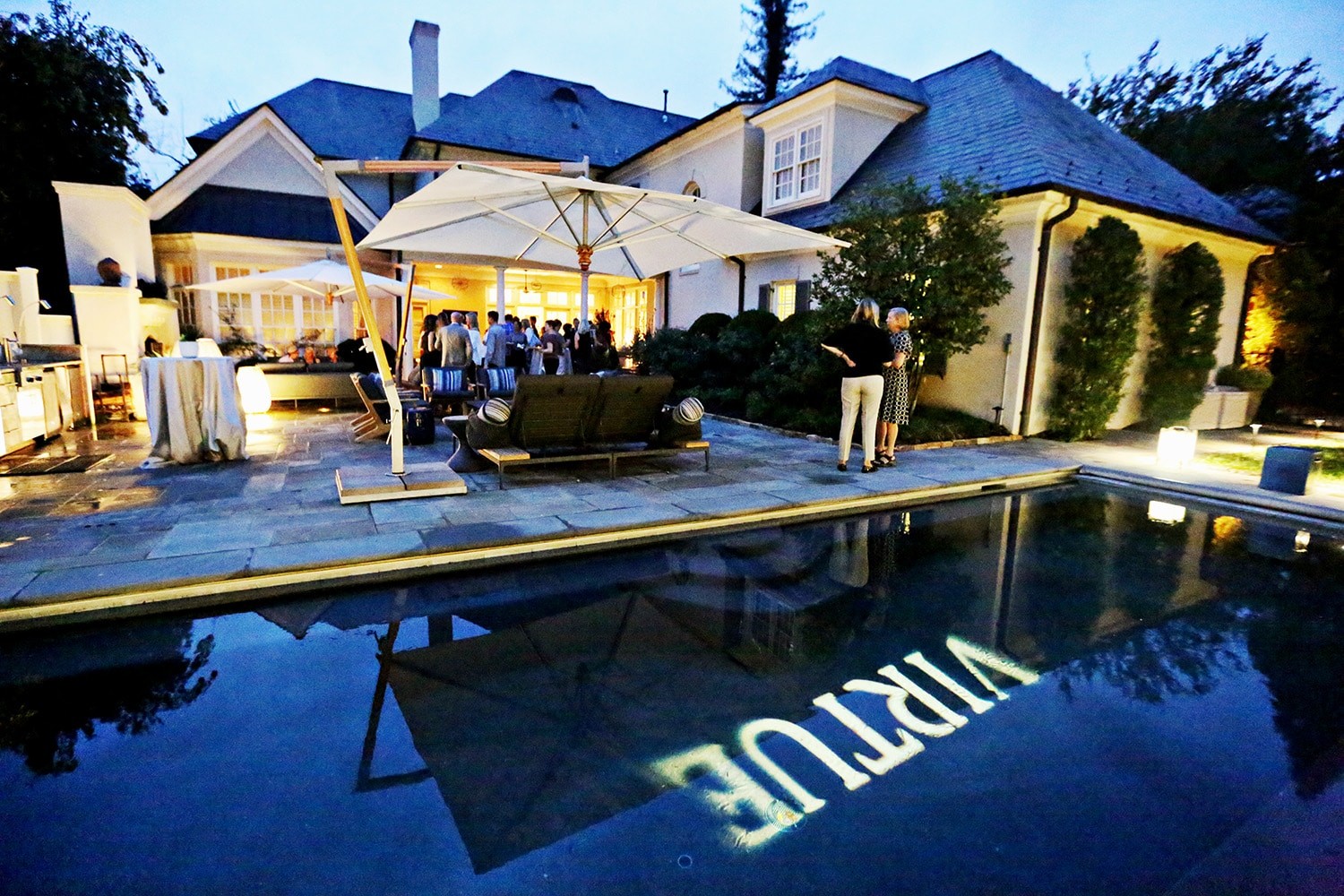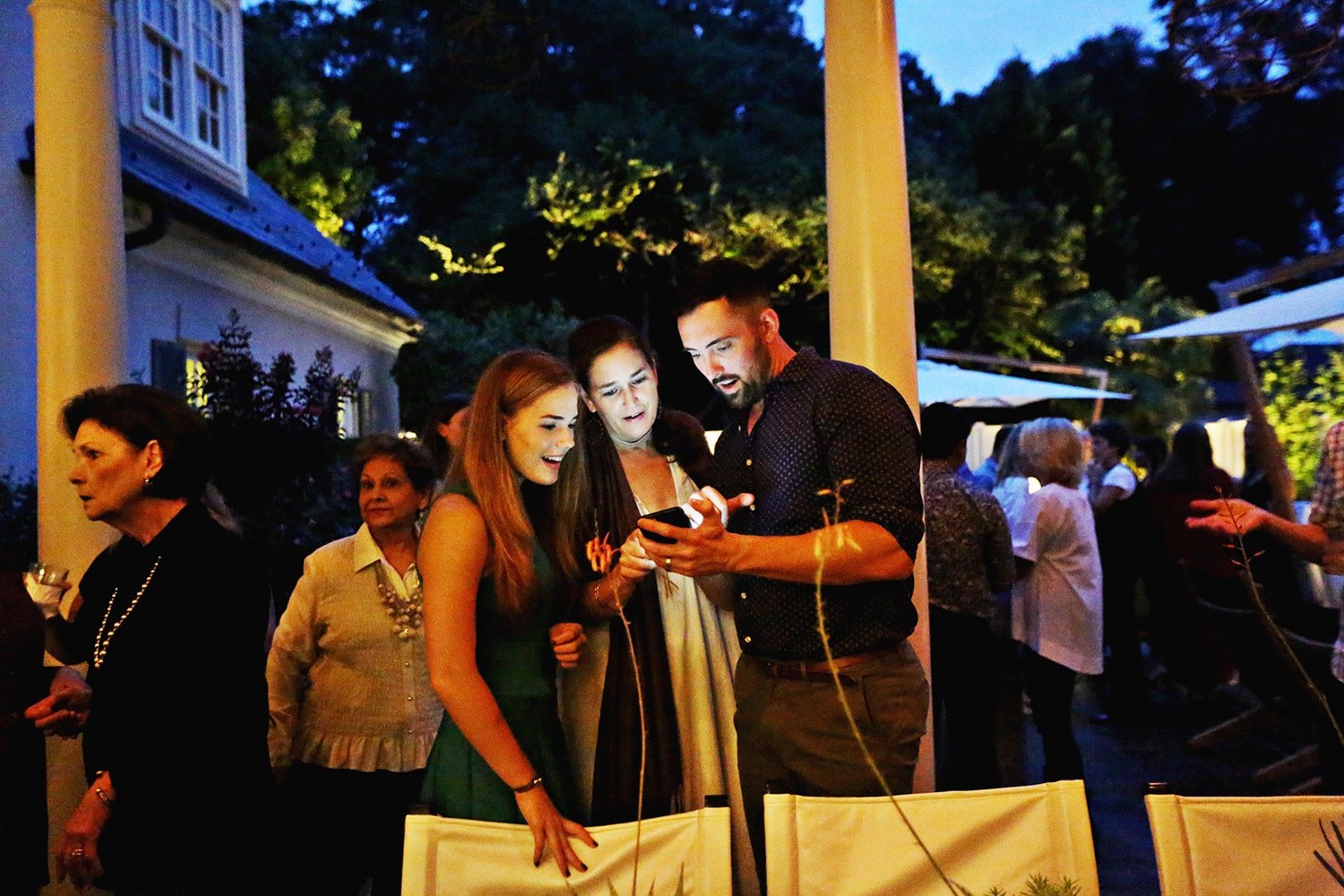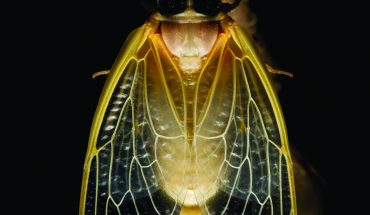Living Virtuously: Melisse Shaban and biotech beauty
by Liza Roberts | interior photographs by Jill Knight
Click to expand photo and view slideshow.
This elegant Hayes Barton home, with its slate roof, french doors, and trim boxwoods, fits right in to its historic neighborhood. A passer-by wouldn’t guess that inside, the stately house is actually a sleek showcase of contemporary art and design.
The same could be said for the homeowner’s place of business. Inside a former R.J. Reynolds tobacco facility on a Winston-Salem street lined with warehouses and chain-link fences, her state-of-the-art laboratory is using proprietary technology to marry biotechnology and beauty to create hair products with what it bills as “revolutionary” powers.
The lab, which extracts a multi-patented form of pure protein from human hair, was built by Melisse Shaban, founder of Virtue Labs. It uses technology originally developed to heal catastrophic battlefield injuries for a new purpose: to rebuild hair and make it more beautiful. Beauty is a subject that Shaban, the former chief executive of Frederic Fekkai and StriVectin, knows a thing or two about.
Still, she credits serendipity for landing her where she is now—living in Raleigh, and on the cusp of a major second act in what has already been a long and successful career. Shaban plans to disrupt the luxury hair care market (eventually skin and nails, too) with what she hopes will become a game-changing, several-hundred-million-dollar, Raleigh-based business.
“It’s been the right place at the right time with this,” Shaban says of her unlikely introduction to the technology that isolates a proprietary form of pure keratin protein—extracted in its native form, recognized and accepted by the body as its own – that now forms Virtue’s backbone.
Five years ago, while “taking a rest” from her career, Shaban heard claims of groundbreaking technology developed by a retired Army colonel seeking a way to use regenerative medicine to treat catastrophic injuries from battlefield explosions. His name was Lt. Col. Dr. Luke Burnett, and he worked at a Winston-Salem biotechnology company called KeraNetics. The technology, Shaban was told, could be used not just for regenerating tissue, bone, and muscle, but also—possibly—for repairing hair. She was cynical about this last bit, but because the source of the news was her next-door neighbor at her house in Wrightsville Beach, she agreed to check it out.
It didn’t take long for Shaban to decide that Burnett and KeraNetics had something real. In addition to its lifesaving properties, the protein appeared to be attracted to the damaged parts of a strand of hair, capable of building it back up and making it thicker. But it took her five years to turn the promise of that protein, Alpha Keratin 60ku, into a line of high-end hair care products.
First, Shaban and her team had to figure out how to adapt the protein for topical cosmetic products (a purpose for which Virtue holds the exclusive rights); then they had to build their own machines to extract it; and finally they had to work out how to infuse the protein into shampoo, conditioner, and styling products.
The $15.3 million backing of a group of North Carolina investors including Greensboro’s Piedmont Capital Partners helped. So did the opportunity to benefit from a $1.7 million grant from the Golden LEAF Foundation to the Whitaker Park Development Authority to renovate and upfit the former tobacco plant; additional support from the Development Authority, the Winston-Salem City Council, and the Forsyth County Board of Commissioners also fueled Virtue’s fire.
Proving it
A breathless reception by the beauty press and the stylists who use Virtue’s products hasn’t hurt, either. In fact, if those insiders – and multiple third-party clinical studies—are to be believed, the sky might actually be the limit for Shaban’s new company.
“Very rarely do we find a product that’s a miracle worker, but when we do, it’s cause for celebration,” said Allure in February when it described Virtue as “a defibrillator for fried hair,” and named its shampoo and conditioner “top 10” hair products for 2017. “Leave it to a group of scientists working on regenerative medicine to stumble upon a technology with major benefits for restoring our tresses,” said Essence, which called Virtue a “scientific breakthrough in a tube.” (It’s worth noting that Virtue products are designed to work for hair of all ethnicities. “Hair is hair is hair,” says Virtue’s chief science officer Erin Falco.)
Oprah’s O magazine and Health have also given Virtue beauty awards for 2017. Adir Abergel, a Hollywood hair stylist famous for red carpet ’dos on actresses like Reese Witherspoon, Jennifer Garner, Kristen Stewart, and Rooney Mara, can’t say enough about it: “Melisse Shaban … sent me the products, and so I used them on my assistant, and, hand to God, in one time of using the shampoo-conditioner on her fried, bleached hair, it felt like 16-year-old virgin hair,” he says. Abergel has since signed on as Virtue’s creative director.
Pros closer to home—and with no skin in the game—are just as enthusiastic. “It creates radical changes in hair,” says Dustin Patrick Smith, co-owner of Raleigh’s Marigold Parlour. “Once I started using it, it was so evident. It transformed my clients’ hair. Most products are like Band-Aids for damaged hair,” he says, but Virtue “has actually figured out how to repair and heal hair. They’re not trying to mask things, they’re fixing things.”
Smith and others who use Virtue products (which range from $36 to $40 a bottle for full-sized, 8-ounce bottles) say it’s not just their hair that sees a benefit; their nails actually become stronger from the mere act of shampooing. Smith says some of his clients have even begun using the shampoo as body wash because they’re convinced it makes their skin look younger.
If all of these fountain-of-youth claims sound a little overheated, Shaban would say she gets it: She needed to see it firsthand, too. Now that she knows people can try it for themselves, her goal, she says, is to get out of the way and let the science do its thing.
“The products we have today are a fraction of what the technology is capable of doing,” Shaban says. “We follow her (Shaban and her staff all refer to the protein with female pronouns), she doesn’t follow us. Every day in the lab she takes us to a place we didn’t know we could go.”
The lab, where Virtue extracts and bottles the protein and tests and tweaks its products, is a fairly unprepossessing place. From the outside.
Inside, it’s spotless and clinical, with newly refurbished rooms set aside for protein extraction, purification, batch-testing, quality control, experimentation, and bottling, as well as thousands of extra square feet for expansion.
Erin Falco, the company’s chief science officer, has a Ph.D. in regenerative tissue. These days, she’s working with Virtue lab technicians and hair stylists to develop new products to grow and build hair, and to add color, volume, and texture to it. “We let the molecule lead us to what it does well,” she says. “We like to play and see what she does best.” They experiment with hair that is fine and straight, coarse and curly, young and old, and everything in between, and introduce elements like heat, cold, and humidity to “see what’s going to happen to your hair on a North Carolina summer day,” for instance.
But first, Virtue has to get that protein. To extract it, the company puts bulk quantities of human hair through a process it developed with machinery built by scientist Bill Jacobsen, whose background in biotechnology from the industry’s very earliest days taught him how to hack existing lab machinery for new and custom applications.
“All of our molecular extraction happens here,” says chief science officer Falco, pointing to a room with a churning machine that looks something like the inside of a clothes dryer combined with a massive silver salad spinner.
The raw material that goes into these machines is uniformly black, straight, untreated hair from China, bought from individuals who grow it to make money. It’s cut by hand and shipped by a specialist importer in tight-stuffed, 1-kilogram (2.2 pound) bags, 12 to 13 to a case. A rolling cart in the lab’s hair room holds 12 cases. “We go through that in two weeks,” a lab worker says. “After we extract it and purify it, it’s liquid gold.”
A great life
For Shaban, a “tried and true New Yorker,” none of this could be happening in a better place. In the Winston-Salem lab, she’s close to the technology’s source and the scientists with links to Wake Forest University who developed it, and proud to be creating jobs there (as many as 60 in the next few years). In Raleigh, her chosen hometown for the last 20 years, she’s eager to make a mark on the creative and entrepreneurial communities and to build a business with size and scope.
Shaban moved to Raleigh 20 years ago from Minnesota, where she was working for Aveda. Recruited to take the job of COO for The Body Shop’s U.S. division, she jumped at the chance to get out of the cold. “I didn’t know where North Carolina was, but I knew it was warm,” she jokes. She soon found “a great life” here, and convinced her family to join her: her parents, grandmother, sister, aunt and uncle, and their kids all soon followed.
These days, Shaban’s own home – a few miles from Virtue’s downtown Raleigh headquarters – is an airy, Russell Groves-designed Hayes Barton house filled with fine art and photographs from artists including Arthur Elgort, Anne Packard, Jason Craighead, Herb Ritts, and many others. It was photographed by Architectural Digest in 2012, and the interiors were recently refreshed. Shaban shares the house with her partner Jane Phillips, an IBM executive, their two young children, three dogs, and good friends who visit often.
Several dozen of them, including Raleigh Mayor Nancy McFarlane, came one recent evening to celebrate Virtue’s launch. Shaban told them that her love of Raleigh has as much to do with her desire to build her company here as it does her excitement for the technology Virtue has harnessed.
“I just love the idea of combining our consumer brand, marketing world with this biotechnology, and landing in Raleigh, and building a team,” she says, “helping Raleigh to become a place where folks in the marketing and consumer products side of things want to live and work.”
At the same time, Shaban says she’s not in any hurry. “This technology is not something we created,” she says. “We must be humble and true and have a moral compass. If we execute properly, and take our time, and stay true to our virtuous DNA to do what we say we can do and do nothing more, and nothing less, we have an opportunity to build a strong and lasting business and brand.”

